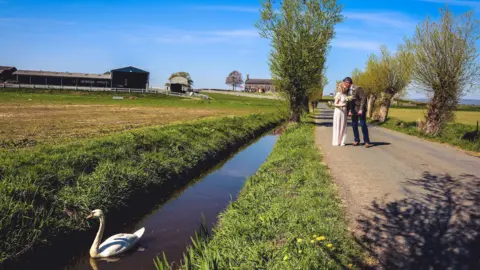The economic landscape of farming in the UK, especially in regions like Somerset, is undergoing significant transformations. As farmers grapple with adverse weather conditions and policy changes, they are increasingly turning to alternative income sources outside traditional farming practices. For many, this shift is not merely supplementary; it has become essential for survival in a challenging economic environment.
Mike Churches, a sixth-generation farmer located near Glastonbury, has shared his experience of this transition. Historically reliant on livestock such as sheep and cattle, he has shifted his focus to hosting weddings and various events at his farm. He confides, “It’s about 30% from farming now, 70% from weddings, falconry, helicopter rides, glamping, you name it.” This dramatic pivot highlights the depths of the crisis within the farming community, where profitability from traditional agricultural practices has dwindled significantly.
The factors contributing to this shift are multifaceted. Farmers like Churches explain that erratic weather patterns, such as the longest wet winter followed by a drought, have severely impacted crop yields and livestock health. Concurrently, governmental policy changes—like the introduction of inheritance taxes on farms and the abrupt cessation of sustainable farming grants—have added layers of financial insecurity. Many farmers are now supplementing their income with non-farming enterprises to navigate these tumultuous times.
According to a report by the UK government, a staggering 71% of farmers now rely on supplementary income from diverse businesses, a notable increase from 61% in 2015. This diversification includes options such as establishing farm shops, creating glamping sites, and even renting out land for solar farms. Tom Collins, chairman of the National Farmers Union in Wiltshire, emphasizes, “It’s no longer just a bolt-on; it’s a crucial part of the business.” In essence, amalgamating agriculture with aspects of tourism and renewable energy is becoming vital for financial sustainability.
Interestingly, Churches and his wife Jenny have taken diversification a step further by acquiring a deconsecrated church that sits on their property, enabling them to host civil wedding ceremonies. “Yes, plenty of people tell us we have the right name,” Churches jokes, referencing the farm’s name and its new venue. Following extensive restoration efforts, they now successfully marry the agricultural heritage of their farm with burgeoning wedding services, which they find far more lucrative than traditional farming.
However, Churches is not the only one engaging in such practices. For those unable to create churches or extensive event spaces, alternative revenue streams are also blossoming. Numerous farmers have started offering wellness services, like beauty salons on their properties, which Michelle Stead successfully operates. Her clinic, dedicated to aesthetic and wellness treatments, attracts clients from neighboring areas and showcases how traditional farming locations can seamlessly transition into lifestyle services.
Statistical findings further reinforce the necessity for farmers to seek alternative avenues for income. Research indicates that over 25% of farmers experience negative income from agricultural activities alone, with many admitting that without diversification, they would face financial strains unimaginable just a few years ago.
Yet amidst this shift, significant concerns about food production reliability linger. Farmers like Collins argue that the financial margins in traditional farming have become alarmingly thin. Despite government assurances of support, with pledges of substantial investments aimed at sustainable food production, many farmers find tangible realities at the farm level drastically differ from policy promises.
In summary, the evolving role of farming in the UK is emblematic of broader economic trends where traditional industries must adapt to survive. As farmers increasingly rely on alternative businesses, the landscape of agriculture is transformed—no longer solely focused on food production but incorporating services that cater to modern consumer demands. The story of Mike Churches and others illustrates a pivotal moment in farming where adaptability, creativity, and diversification are no longer optional, but rather essential for viability and success.



